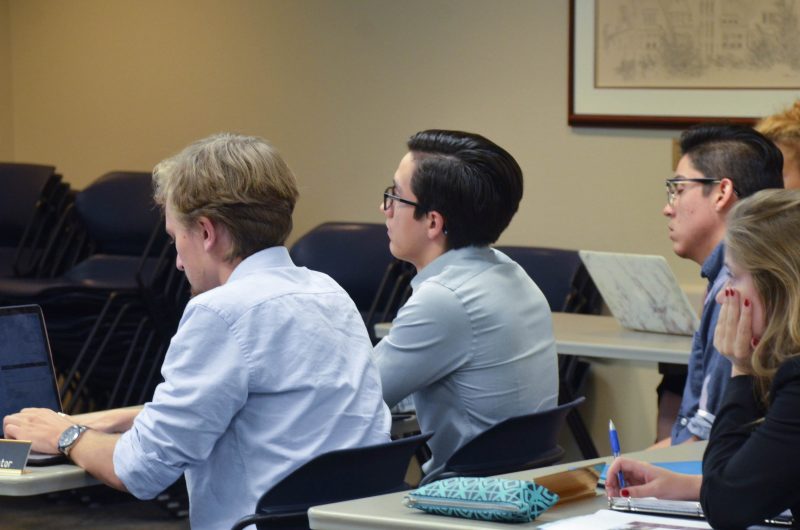My fellow senator Maddie D’Iorio wrote an opinion column last week highlighting SGA’s “existential problem,” in which she cites the inexperience of “15 college students,” the apathy of the student body and a broken system that encourages overspending. While senator D’Iorio brings up some very important points, I disagree with some of her opinions on the nature of SGA spending and I think that some of her suggestions are misguided.
First, I wholeheartedly agree that students should take the initiative to let SGA know what their problems are. It is much more difficult to advocate for student interests when students do not tell us what those interests are.
However, that is not to say that SGA is clueless with the Student Activity Fund (SAF). I take issue with the characterization of SGA as “15 college students without formal financial training.” Rachel Daniel, SGA vice president, is an accounting major who handles all of the big-picture budgetary concerns through meticulous recording and budgeting of our past, current and future funds. She has laid out a month-by-month framework by which the senate plans to keep spending within appropriate amounts — plans which, so far, have been very successful.
Vice president Daniel does not work alone, either. She works extensively with treasurer Hannah Larson and adviser Jamie Thompson, director of Student Involvement, to ensure that we are staying fiscally responsible for the funds entrusted to us by the SAF. Between the application process for student groups, the meticulous budgeting and the cooperation with staff, I would argue that SGA’s management of funds is the most effective it has been since I enrolled at Trinity.
Therefore, to suggest that we need an additional adviser with veto power is absurd to me. These funds have been allocated for students, to be managed by students. For us, as student representatives, to give complete veto power over these funds to a non-student would be an insult to the student body. It would undermine the entire idea behind the SAF and tell the university that students cannot be trusted with any real-world responsibilities. I do not think SGA should require formal financial training, especially when you consider the amazing support we have from advisers like Jamie Thompson. Budgeting is an important process that is useful to any career, and as students of a liberal arts university, we should be able to expand beyond our majors and help make responsible financial decisions for the benefit of our peers.
Furthermore, Senator D’Iorio’s column makes some inaccurate claims about the nature of increased University-Sponsored Organization (USO) funding and the role that Campus Publications and Recreational Sports play in it. First of all, Campus Publications and Rec Sports are not USOs. The five-year average rule is an extremely important clause that protects them both from unfair budgetary constraints. Essentially, the Trinitonian and the Mirage must be guaranteed this average so that SGA cannot choose to punish the publications for coverage that they don’t agree with. This may seem like an unlikely scenario, but student publications across the country are currently being defunded for disputes with their student government or university administration. Without this five-year average protection, the independence of student journalism on our campus is essentially nonexistent. Campus Publications should not have to satisfy SGA in order to receive funding. The amount we give them is essentially a subscription fee on behalf of the entire student body in order to support free and independent journalism on our campus.
While the funding requests from USOs, Campus Publications and Rec Sports have increased in recent years, this is largely due to the increased costs of running student activities on our campus. The membership of club sports nearly doubled just last year, the Trinitonian is facing increased publishing costs, and we just welcomed our largest class ever this fall. With more students and more involvement comes more costs, and this is not the fault of the organizations who ask for more money just to keep their activities running. Rather than blame USOs, RSOs and every other acronym under the sun, our focus should be on the larger institutions that could easily help us with our funding issues: the university itself.
Tuition over the last eight years at Trinity has increased 34 percent, but none of that money has ever reached the Student Activity Fund. Wouldn’t it make sense for student activities to receive more funding if the university needs more funding to run the campus? Why should the university require more tuition to attend a growing school while the SAF stays at a stagnant $150? Instead of playing the blame game within the student body to try and determine who is the greediest or which system is broken, I believe that it is time for all students and their representatives to argue for interests that would benefit all student organizations.







Tiana • Oct 7, 2018 at 10:05 am
But why do Greek organizations get a share of the money? They are exclusionary groups therefore they don’t benefit the whole student body which is what the money is for.